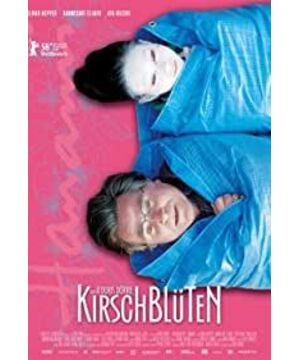The next generation's scarcity of time and emotional
cherry blossoms suggest a very strong sense of alienation and powerlessness, from the indifference and busyness of the couple and Rudy's children who have always been alone after Du Li's death. Whether in Berlin or Tokyo, the three sons and daughters have no time. The irony is that at this time, whether it is Du Li or Rudi, there is not much time left. In fact, parents who don't have much time have time, and children who live a long life "have no time." It should be noted that the three sons and daughters in the movie also each showed varying degrees of love and attachment to their parents, as well as guilt. For example, a daughter would cry to her girlfriend after she was angry with her parents and caused them to leave. Said and acted badly, the younger son burst into tears after eating the cabbage roll his father made before his mother was alive, and after getting drunk, he would call his father an idiot who didn't understand his mother... But the problem is that they did nothing, even if The sudden death of their mother made them sad and regretful, and their love for their father was still busy and materialized. None of them could do anything for their father. In materialization and urbanization, people lose their emotions and cannot help themselves. Even if they have subconscious emotional resistance, they are limited to thoughts and cannot act. They passively give up resistance and allow themselves to be swallowed by the cold torrent.
The two people who warm Rudy in the film, one is his daughter's gay girlfriend, and the other is a wandering dancer in Tokyo. Two unrelated people can understand Rudy's pain. I just haven't figured out what the symbolic meaning of the lesbian imagery in the movie is, why it happens that a gay girlfriend cares about her "in-law", and the image of a lesbian also appears in the comic book of the youngest son's house in Tokyo, with the bed (?) In the wall painting of , one cannot guess the director's intention. The second Rudy's Redeemer, and ultimately the more thorough one, is the figure of an artist and a wanderer, a figure of a young girl in a big city who has no place to sleep in a tent and live on alms. Her name is "YOU". She lost her mother a year ago and has always performed buta in the park, nostalgic for her mother and coexisting with her mother's shadow. YOU lives in the world of the deceased, the world of yesterday, like a serene island amid the terrifying noise and crowds of Tokyo. In contrast, Rudy went to Tokyo to look for traces of the dead Du Li, and the strippers and bathing girls he saw meant the world in front of him. And Rudy, who returned home, said in sadness and disappointment, "I can't find Du Li, I don't know where she is." Just like the two bathing girls, they didn't understand why the foreign old man in front of him shed tears. The bathing girl's young hands caressed Rudi's old and dying body, but the viewer couldn't tell which side of life existed. Seeing the young woman's smile and body, it seemed like seeing the abyss of rotten flesh...
Lu Di finally saw Mount Fuji, danced under Mount Fuji and found Du Li, who took him to another world. YOU still dances in the park every day, and now her shadow may not only be her mother, but also Rudy. Rudy's sons and daughters say "it's not like a father at all" about their father who ended up on Mount Fuji with an 18-year-old girl in his mother's clothes, and only gay girlfriends say maybe he's finally found happiness.
The seemingly complete statement implies the deepest despair of the viewer: whether the dead Rudy or the living YOU, happiness can only be found in the world of the deceased.
The most impressive memory of the film is Du Li's last time watching Buta in her life. The old performer, with disheveled hair and naked, interprets it again and again as if convulsively amidst the heavy drum beat... Suddenly on the hard ground. , eagerly rolls over... Elbows and knees are red and swollen. And that pale face, depicting an exaggerated expression like pain and frenzy in surprise.
View more about Kirschblüten - Hanami reviews











